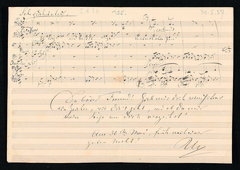Richard Wagner Manuscripts to be Digitized
Laura Schroeder
Monday, July 23, 2018

This article first appeared on the website of the Richard Wagner Museum Bayreuth and is reprinted here with kind permission.
Preserving and making accessible collections of cultural and historical value: A digitization project at the National Archives of the Richard-Wagner-Stiftung in Bayreuth
Anyone wishing to consult the important holdings of the National Archives of the Richard Wagner Foundation has so far had to head to Bayreuth and submit an application form, including a well-founded reason for using the materials, to be allowed to view items for research purposes such as letters or scores in Richard Wagner’s hand. This is about to change thanks to a three-year digitization project. This will serve to both protect the collection and its long-term preservation and will make over 16,000 documents from Richard and Cosima Wagner’s estate available online.
The National Archives in Bayreuth houses and maintains the world’s largest collection of archival materials related to the Leipzig-born composer Richard Wagner (1813-1883), his second wife Cosima (1837-1930), and their descendants. With its extensive holdings of autograph materials, manuscripts, letters, music materials, objects, photographs, and research literature, the National Archives is the world’s most important research center related to Richard Wagner as a person, his works, and his impact.
The goal of the digitization project is to provide academics and interested parties access to the archival holdings from anywhere in the world with an internet connection through the website of the Richard Wagner Museum Bayreuth. The documents in the archives will be able to be searched online according to various criteria such as originator, date, or place of origin and will be displayed on the screen as high-resolution color scans. The project, which began at the end of 2017, is largely made possible through financial support at the federal and state levels from the Beauftragte der Bundesregierung für Kultur und Medien, the Oberfrankenstiftung, and also from bavarikon, the online platform of Bavaria for the presentation of artistic, cultural, and intellectual treasures.
Immediately after the completion of the long-term project that saw the renovation, expansion, and redesign of the Richard Wagner Museum and its reopening in summer 2015, the search began for sponsors of the digitization project, suitable software and hardware, an appropriate service provider to carry out the digitization process with a special document scanner procured especially for this purpose, and for staff to create the metadata. At the same time, the collection was thoroughly examined and material that needed conservation attention was transferred to acid-free boxes.
Now that this preparatory work is complete, the path is now clear for digitization and cataloging in the database. At present, the heart of the archival holdings are being digitized: original handwritten letters by Cosima and especially Richard Wagner, his notebooks, and the fair copies of his scores. Following this, the digital copies will be cataloged in the museum’s own database, thus creating the basis for their online presentation.
Image: Manuscript page with a letter by Richard Wagner. Source: Nationalarchiv der Richard-Wagner-Stiftung, Bayreuth.
Share Tweet EmailCatégorie: Collections de bibliothèques

